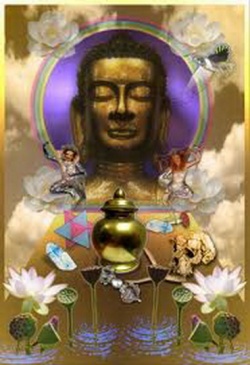Difference between revisions of "Three doors"
Jump to navigation
Jump to search
(Created page with "thumb|250px| A person's '''three doors''' (Skt. ''tridvāra''; Tib. ''go sum''; Wyl. ''sgo gsum'') are his or her: *body (Skt. ''kā...") |
|||
| Line 15: | Line 15: | ||
{{RigpaWiki}} | {{RigpaWiki}} | ||
| − | [[Category:Vajrayana]] | + | [[Category:Vajrayana]]{{BuddhismbyNumber}} |
Revision as of 10:21, 22 April 2014
A person's three doors (Skt. tridvāra; Tib. go sum; Wyl. sgo gsum) are his or her:
- body (Skt. kāya; Tib. lü; Wyl. lus),
- speech (Skt. vāk; Tib. ngak; Wyl. ngag), and
- mind (Skt. citta; Tib. yi; Wyl. yid).
Through these three doors, we accumulate either positive or negative karma. Of the three, the mind is the ‘boss’, and the body and speech are subservient.
In Vajrayana, the three doors are considered to be, in essence, the three secrets or three vajras.
Alternative Translations
- Three avenues of being
- Three gates
